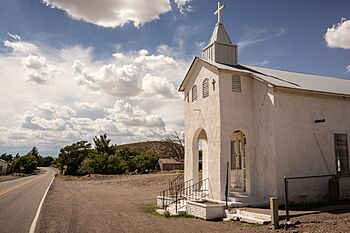Cuchillo, New Mexico facts for kids
Cuchillo, originally known as Cuchillo Negro, is a small community in Sierra County, New Mexico, USA. It was named after an Apache leader called Baishan. He was also known by his Spanish name, Cuchillo Negro, which means "Black Knife." He died in a fight with American soldiers in 1857. The community is located on the north side of Cuchillo Negro Creek. Cuchillo's name changed after the year 1900. It was officially recorded with its current name in the 1910 Census.
History of Cuchillo
Early Days of Cuchillo
People believe Cuchillo was founded around 1871. However, areas along Cuchillo Negro Creek were being farmed even before 1869. Farmers from Alamocita started planting crops here in late 1867. Alamocita was a town founded by people from Alamosa. Their original town was destroyed by a flood in 1867. These early farmers grew corn to supply the Southern Apache people.
In 1872, some settlers left the area because they feared an Indian uprising. But later that year, General O. O. Howard visited a small New Mexican village he called Cuchillo. He bought food supplies there for an Apache group led by Ponce. This was part of his effort to find and meet with Cochise to make peace.
The Plaza and Growth
The town first appeared on a map in 1875 as the Plaza Cuchillo Negro. This name suggests that the houses were built around a central open space, called a plaza. This was a common way for frontier settlements in New Mexico to protect themselves. The buildings formed a defensive wall against raids from hostile Apache or Navajo groups.
The town of Cuchillo Negro first appeared in the Census in June 1880. At that time, it had 233 people living in 51 houses. Most of the people were born in New Mexico. Many families were farmers, while others worked as laborers. There were also freighters, a tailor, and a miner. In 1881, the creek near the town was described as having excellent water. The land around it was perfect for irrigation using the stream.
A post office opened in Cuchillo Negro in 1883. It has been operating ever since. By 1895, the town had developed a community irrigation system. This system used a dam eight miles upstream to water 300 acres of land in the town. It also irrigated 200 acres further upstream using private ditches.
By 1928, the community ditch irrigated 450 acres. There were also other dams and private ditches upstream. These helped water hay fields and pastures. In 1940, the ditch at the town irrigated about 400 acres.
Schools in Cuchillo
The Truth or Consequences Municipal Schools district serves the entire county. Students in Cuchillo attend schools in Truth or Consequences. These include Truth or Consequences Middle School and Hot Springs High School.
 | Isaac Myers |
 | D. Hamilton Jackson |
 | A. Philip Randolph |


